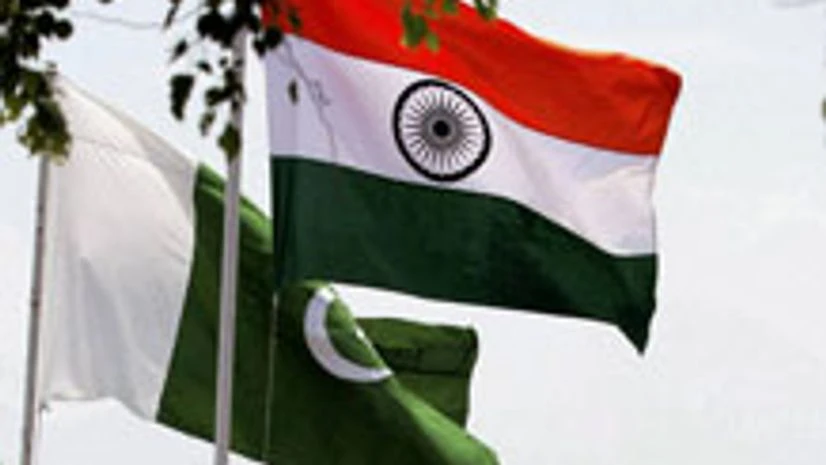The government on Monday cancelled the much-awaited meeting between the foreign secretaries of India and Pakistan to lay out the way ahead for bilateral ties. The decision came after that country’s High Commissioner Abdul Basit decided to go ahead with meeting some Kashmiri separatist leaders, despite the foreign secretary “warning” him not to do so.
“Choose a dialogue with India or separatists. Pakistan’s interference in India’s internal affairs is not acceptable,” Foreign Secretary Sujatha Singh is learnt to have told Basit, even as the first of Kashmiri separatist leaders, Shabir Shah, drove into the mission on Monday.
The foreign secretary-level talks were scheduled to take place in Islamabad on August 25. The larger Sangh Parivar, particularly the Vishwa Hindu Parishad, was vocally opposed to talks if Pakistan did not stop hobnobbing with Kashmiri separatist leaders. Sources said the Rashtriya Swayamsevak Sangh (RSS) had also conveyed to the government that the Pakistani envoy’s meeting with Kashmiri separatist leaders days before the foreign secretary-level talks was incompatible with improved India-Pakistan relations.
That India and Pakistan should resume talks was decided during Prime Minister Narendra Modi’s meeting with his Pakistani counterpart, Nawaz Sharif, on May 27. In an unprecedented gesture, Modi had invited Sharif to his swearing-in ceremony which the Pakistani PM had accepted. The two had then decided to start a “new chapter” in the bilateral relationship. The swearing-in ceremony invite to Sharif is said to have had RSS’ blessings.
Earlier this month, business delegations from both countries had met in New Delhi.
According to Syed Akbaruddin, spokesperson in the external affairs ministry, the government saw “no useful purpose” of the meeting, which could otherwise have marked the beginning of a new era in Indo-Pak ties. He also said this could have been an opportunity to resume the stalled composite dialogue that encompassed all aspects of the relationship between the nuclear-armed neighbours.
“At a time when serious initiatives were being taken by the Government of India to move bilateral ties forward, including towards the resumption of a regular dialogue process, the invitation to so-called leaders of the Hurriyat by Pakistan’s High Commissioner does indeed raise questions on Pakistan’s sincerity and show that its negative approaches and attempts to interfere in India’s internal affairs continue unabated,” he said. Akbaruddin added the only way to resolve the outstanding issues like Kashmir could only be done within the framework of the Simla Agreement and the Lahore Declaration.
|
TOUGHENING STANCE Relations with Pakistan since the Modi govt took charge |
|
Basit had called a two-day meeting with separatist leaders Shabir Ahmed Shah, Mirwaiz Umar Farooq, Yasin Malik and Syed Ali Shah Geelani, whose main agenda was to put forward their stand on the Kashmir issue before the foreign secretary-level talks.
“It is a long-standing practice that meetings with Kashmiri leaders are held before Pakistan-India talks to facilitate meaningful discussions on the issue of Kashmir. The Indian decision is a setback to the efforts of our leadership to promote good neighbourly relations with India,” said Pakistani foreign office spokeswoman Tasnim Aslam. Apparently, Indian officials were irked by the fact that Shah was already present in Basit’s office in New Delhi, while Geelani and Malik, according to reliable sources, were likely to meet on Tuesday.
“This is unprecedented. It has never happened in the past 24 years. This will not give a good signal to Kashmir. It seems Modi has taken a hard line as far as Kashmir issue is concerned. How can the government expect a dialogue to happen if it does not allow interactions to go through. Interactions were on even in the earlier National Democratic Alliance and the United Progressive Alliance regimes. Even (former) prime minister Atal Bihari Vajpayee allowed us to speak. Then why such a change of stance now?” JKLF Chairman Yasin Malik said.
After a series of incidents of ceasefire violations in Jammu & Kashmir, the Modi government was under severe pressure from within the party to call off the talks, it is learnt. Defence Minister Arun Jaitley on Monday said the “provocative” act of talking to Kashmiri separatist leaders and “deliberate” border ceasefire violations clearly showed the neighbouring country and “powers within it” did not want normal relations with India. “It is clear there is deliberate ceasefire violation from the Pakistani side. Earlier, it was only on the Line of Control but now it is also on the international border,” he said.
“It is very strange and ironical that Pakistan High Commissioner Abdul Basit dared to invite Kashmiri separatists in Delhi on August 19 to have consultations ahead of Indo-Pak foreign secretaries’ meeting on August 25,” said VHP patron Ramakant Dubey said. The BJP on Monday welcomed the decision to call off the talks and called it a bold decision. The Congress, which had earlier questioned the rationale for talks, accused the government of adopting “incoherent and opaque” foreign policy. “What prompted the Narendra Modi government to decide to hold foreign secretary-level talks with Pakistan when there was constant provocation from the other side through constant ceasefire violations,” asked Congress leader Anand Sharma.
Monday’s move could make a dent in Modi’s plans to revive ties with its neighbours and make South Asia a force to reckon with. During his visit to Leh on August 11, Modi had accused Pakistan of indulging in a “proxy war” against India. The comments had invited sharp criticism from Pakistani leaders, who called it “baseless rhetoric”.
The situation is believed to have worsened with Pakistani Rangers indulging in unprovoked firing and shelling through Sunday night, killing two BSF soldiers in Jammu’s Pulwama district. Even as Modi called for greater cooperation among the Saarc members to fight poverty, he did not say anything about the India-Pakistan relations in his Independence Day speech. Jammu & Kashmir, Maharashtra, Haryana and Jharkhand are scheduled to go for Assembly polls later this year. The understanding is the BJP-led government might have checkmated the Congress’ hopes of making political capital out of the Indo-Pak talks.

)
